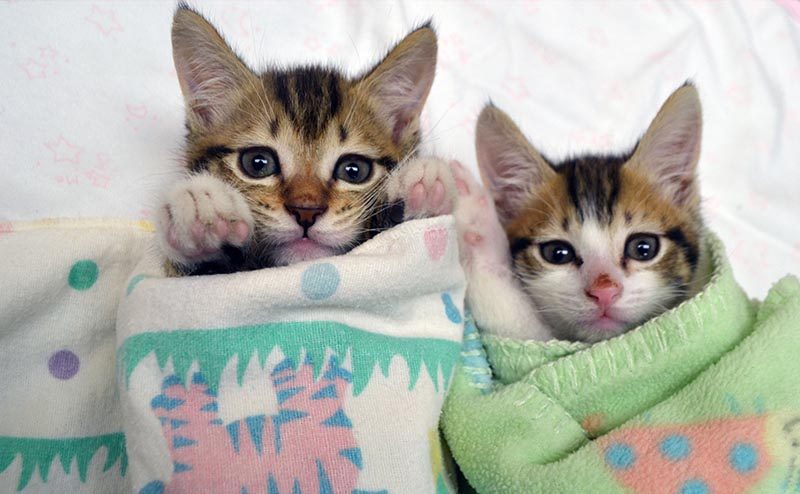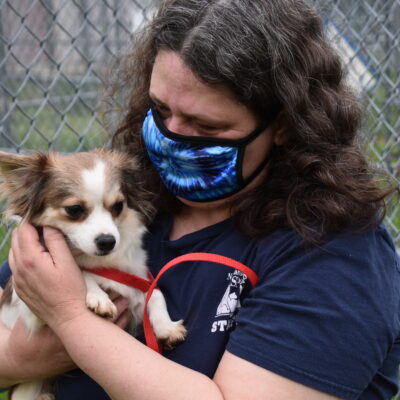
The sun is shining, flowers are beginning to bloom, the grass has turned green and birds are chirping. Spring has arrived! You are walking down the street when you hear a tiny “meow”. Did you imagine it? A quick inspection of a nearby bush confirms your suspicion. You find a small kitten nestled in the bush and quickly swoop into action to rescue it.
But wait! Did you know that the majority of kittens found outside are not orphaned kittens? Most of these tiny felines are being meticulously cared for by their moms who are community cats.
Community cats are cats that live outside and often times are intentionally/unintentionally provided with resources, such as food and/or shelter, by members of the community. Community cats live in family groups called “colonies”. Community cats may be categorized as tame or feral based on their behavior around humans. Tame community cats have been socialized and are comfortable with human interaction. Feral community cats have not been socialized and are uncomfortable with human interaction.
Regardless of the mother cat’s socialization status, she is ALWAYS the most capable caregiver for her kittens. In fact, when we attempt to intervene in caring for kittens by removing them from the outdoors before they are weaned from their mother, we actually decrease their chance of survival. The animal shelter is a particularly difficult place to provide appropriate care for these tiny babies due to limited resources and increased risk of exposure to infectious disease.
So how can we help these fragile kittens and ensure that they are cared for?
Assess health status –
Well-cared-for kittens will be clean, warm, plump with full round tummies and alert.
Sick kittens may be cold, thin, dirty, have nasal/eye discharge, wounds, or other signs of illness/injury.
Assess age –
Kittens younger than 8 weeks old are not ready to be separated from their mother and siblings. Their appearance will vary depending on age, but these kittens weigh somewhere between just a quarter of a pound to 2 pounds, may still have their eyes/ears closed, may be in various stages of learning to walk/play, and may/may not be capable of eating solid foods.
Kittens between 8-12 weeks old are the perfect age to be socialized, receive routine veterinary services, and be adopted into a home. These kittens are alert/active, playful, fully weaned/eating solid food, and should weigh 2-3 pounds.
Kittens greater than 12 weeks old may be past the window of socialization to become an indoor pet but can still have a happy life as a community cat. These cats have an appearance that is closer to an adult cat.
Assess if they are orphaned or being cared for by their mom –
If you have found a healthy kitten, chances are mom is nearby and may not be returning because you are present. Mom may have been off hunting for food or could be in the process of relocating her kittens.
In order to determine if mom is returning or not, you can leave the site and watch from a distance to see if she comes back. Resist the urge to continually check on them as this may deter mom from returning. If you are unable to monitor the site for a long period, you can leave a ring of flour around the kitten. If you see adult paw prints in the flour when you return, you know mom has been back to care for the kittens. If mom has not returned after 4-6 hours, the kittens may be orphaned.
Healthy kittens under the age of 8 weeks that are being cared for by their mom in a safe location should always be left alone. Once they reach 8 weeks, we recommend that mom and all of the kittens be trapped so that they can all receive veterinary services for vaccinations, deworming, and spay/neuter. After that time, the kittens will be ready to be socialized and then adopted into their new homes. The mom may be placed in an adoptive home if she is tame, or returned to the community where she lives if she is feral. Providing veterinary care, particularly spay/neuter services, for all of the community cats in a colony is the best way to ensure that the population is controlled. Our ultimate goal is to prevent community cats from reproducing so that eventually all cats can be cared for in a home environment by their owners.
Sick, injured, or orphaned kittens should never be left outside and do require your help! Always remember to proceed with caution and use protective equipment, such as thick, bite-proof gloves, to handle any unfamiliar cat. Even as kittens, community cats may be un-socialized and prone to biting/scratching. If you are injured by a cat, always contact your doctor right away as emergency treatment may be indicated.
If you find kittens outside and are unsure about how to proceed, please contact the NHSPCA for assistance in determining if this kitten needs help and additional information on resources we provide.
Dr. Sonja Kygeris is the staff veterinarian at the New Hampshire SPCA.

